Access to The Champion archive is one of many exclusive member benefits. It’s normally restricted to just NACDL members. However, this content, and others like it, is available to everyone in order to educate the public on why criminal justice reform is a necessity.
The woods are lovely, dark and deep.
But I have promises to keep,
And miles to go before I sleep,
And miles to go before I sleep.— Robert Frost
It has been a pleasure to serve as president of NACDL. The work of this organization catapulted in new directions as challenges to the criminal legal landscape made it increasingly difficult to remain passive in the wake of numerous measures enacted to erode the constitutional, human, and civil rights of our clients. As the divide has grown wider with each political issue, the scope and breadth of NACDL’s portfolio of projects has grown in response. The Task Forces on the Criminalization of Reproductive Rights and the Criminalization of Voting Rights represent two areas that garnered immediate attention and resources from NACDL. The pace has escalated, and the work has broadened, but we have miles to go and much work to do before any of us can sleep.
The implementation of the Task Force on Law Enforcement Accountability and Transparency also represents one of these recent focus areas. Co-chaired by me, Jonathan Brayman (Illinois), and Ian Wallach (California), this work group seeks to support and advance critically needed reforms in the space of law enforcement contact with our clients. The task force also endeavors to examine the systems and agency cultures that facilitate and endorse continued negative, and sometimes deadly, civilian interactions with police, particularly in communities of color.
Oversight and accountability of law enforcement is a challenge in this country, particularly given the constant political refrain that internal or external guardrails, of any kind, hamstring law enforcement to a degree that makes citizens less safe and would bankrupt local municipalities. This blanket, unsupported excuse that shields bad cops — and the business-as-usual schemes that ensure and endorse keeping these officers on the streets — has grown old. The curtain must be pulled back on this narrative wholly unsupported by data and common sense. The frequency of news accounts of unlawful officer-involved shootings, incidents of police brutality, and unconstitutional searches and seizures has contributed to a shift in public perception that may lead to the actualization of some of these needed reform efforts.
Whether it is much-needed judicial reform in the context of Section 1983 civil rights actions, community oversight via civilian review boards, the enactment of meaningful internal affairs and decertification procedures, or the imposition of criminal consequences when officers commit criminal acts, the ploy of ginning up fear to thwart change is prime for reversal.
Along with resisting the fearmongering around these issues, this country’s unadulterated idolization of the law enforcement industry generally serves as an impediment to reform. A religious-like reverence for the police, with financial backing akin to a slickly marketed and well-pastored megachurch, blinds us from addressing the serious and dangerous misdeeds of individual bad actors. I do not suggest that officers deserve disrespect or that they do not perform an incredibly difficult, dangerous, and necessary function. The balance lies, however, in making sure that all people on our streets feel safe from whatever threat is out there, whether it be civilian or law enforcement threats to safety or the integrity of our democracy. Our expectations should be guided by the facts and circumstances of individual officers and agencies, not guided by the notion that the whole of law enforcement represents some special class deserving of blanket protection simply by virtue of the uniform its members wear. The real shield around law enforcement exists in the excuses we make as a country for not demanding better from this industry.
I am keenly aware that a number of groups are working in this space and on these issues. However, none of those voices have the unique perspective or access to the courts that the criminal defense bar has. Defenders are the frontline observers, statement takers, investigators, and voices for citizen-police encounters. I am a firm believer in seeing a case all the way through if harms or offenses were perpetrated against a client. If there is a process in place to address these issues, even if not a perfect one, employ it. If we are witness to these harms, I do not believe we should sit back and let things play out so that the next suspect in an officer’s sights simply becomes another data point in the officer’s dossier or another victim of police brutality. This takes extra work and may seem foreign to those of us used to just treading back and forth to criminal court. In addition to motions to suppress and discovery around the criminal elements of an accusation, investigations into other components of police encounters could protect your client’s civil rights for future litigation or internal affairs grievances. Making a record holistically matters for your client’s present situation. It also matters for the betterment of the system in the fight for our future clients, ensuring that incidents are viewed as more than just anecdotal grievances. The preservation of this information via law enforcement misconduct databases is important in charting these patterns and practices. If funding could ever sustain these platforms, these databases would forever change our practice and the lives of our clients in terms of contact with law enforcement.
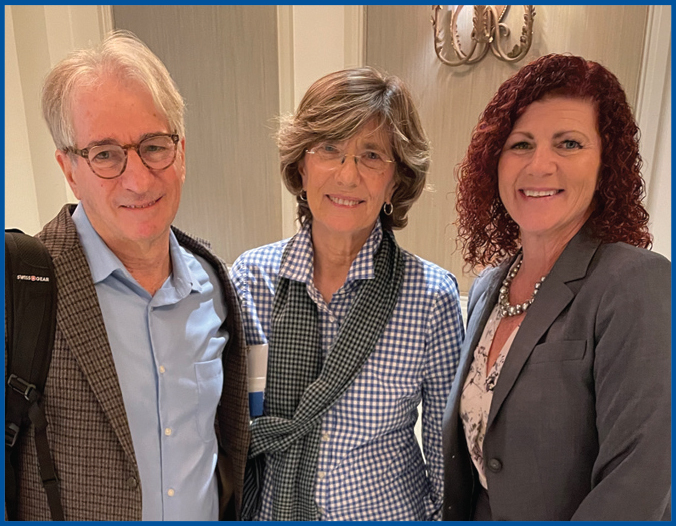
(Left to Right) Barry Scheck, NOLA Civil Rights Attorney Mary Howell, President Nellie King.
The Law Enforcement Accountability and Transparency Task Force is also taking its efforts on the road by conducting listening tours in host cities for NACDL events. In March, the New Orleans stop proved eye-opening, as longtime civil rights activist Mary Howell described the history of a city plagued with racially charged law enforcement problems for the duration of her 30-year career and for many decades before that.
In May, in conjunction with NACDL’s Race Matters VI seminar in Cincinnati, the task force hosted Mayor Aftab Pureval, Police Chief Teresa Theetge, City Manager Sheryl Long, City Solicitor Emily Smart Woerner, members of the City Council, and civil rights activists Iris Roley and Al Gerhardstein for a discussion about post-consent decree reform efforts. The decree came about in 2001 when the mayor at that time requested that the U.S. Department of Justice review the Cincinnati Police Department’s use of force history.
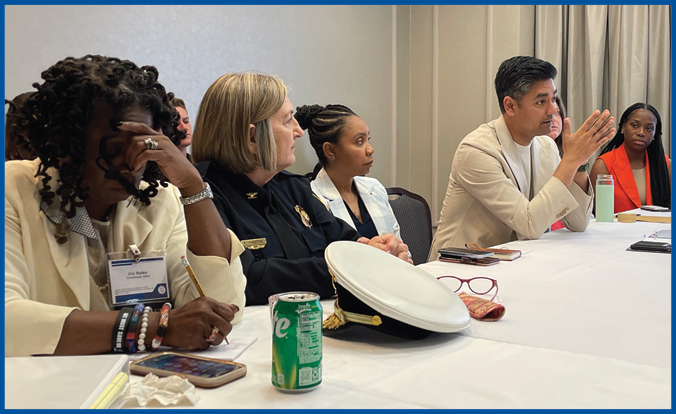
(Left to Right) Iris Roley, Cincinnati Police Chief Teresa Theetge, City Manager Sheryl Long, and Mayor Aftab Pureval.
DOJ’s investigation, conducted with the full cooperation of the city, resulted in a Memorandum of Agreement identifying changes to be made by the Cincinnati Police Department. The Memorandum terminated in 2007 with 93% compliance with the agreement terms and conditions. City leaders and activists are still working toward full agreement compliance today. One of those activists, Iris Roley, has open lines of communication with city partners and regularly intervenes when law enforcement-citizen encounters become heated or require intervention and subsequent investigation. She also advocates for Cincinnati’s Black youth when law enforcement becomes involved: she is listening, mentoring, and advocating. Longtime Cincinnati civil rights lawyer Al Gerhardstein also pushes continually for improvements to law enforcement/community relations by keeping the police department and the city accountable when misconduct or abuses occur.
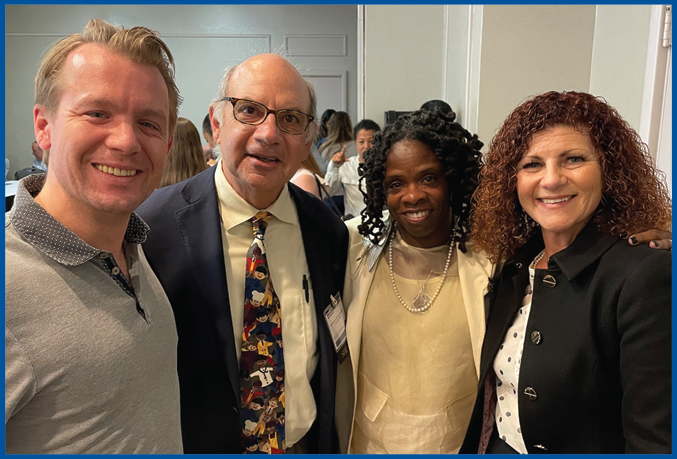
(Left to Right) Task Force Co-Chair Jonathan Brayman, Cincinnati Civil Rights Activists Al Gerhardstein, Iris Roley, and President Nellie King.
The meeting in Cincinnati was most impactful, however, because of the other folks at the table: public defenders. The Cincinnati public defense community showed up in substantial numbers to hold officials accountable from their vantage point in the wells of Cincinnati’s courtrooms. The conversation was an important one. The defenders left with the promise of future meetings with the mayor, city manager, and police chief. This approach — in which everyone was at the table seeking solutions to serious problems — is refreshing. It is a model worthy of replication, if at all possible, in communities around the country. The task force looks forward to its next stop, Chicago, during NACDL’s Annual Meeting in August.
During my term as president, NACDL welcomed a new executive director, Lisa Wayne. Lisa jumped in with both feet and has been excellent in guiding the many projects and priorities of the organization and managing the many staff members that make it all work. I want to thank Lisa for her commitment to NACDL and its values. I also want to thank each of the NACDL staff members for all that they do. The staff of NACDL is dedicated, talented, and selfless in this work. NACDL’s members are fortunate to have this tremendous team behind the organization.
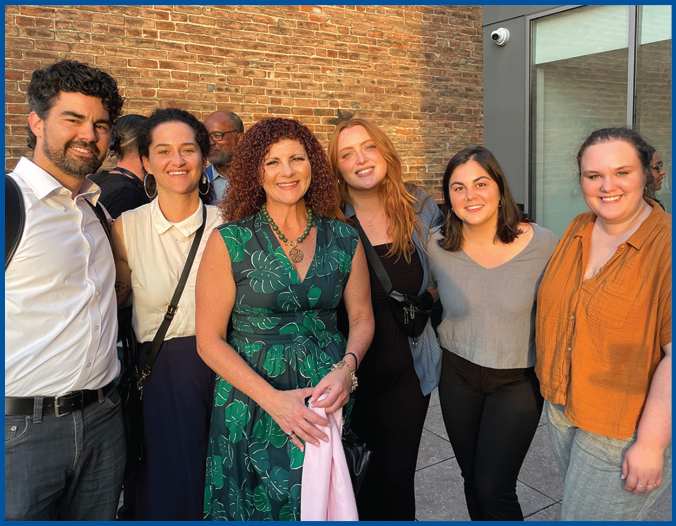
Cincinnati Public Defenders gather with President Nellie King during NACDL’s Race Matters VI Seminar in Cincinnati.
I also must thank you, the members of NACDL. I have been honored to serve as your voice, and I sincerely appreciate the folks I met along the way. The journey this past year was comprised of approximately 30,000 air miles and dozens of hotels, airport lounges, and road trips. I would not change a thing. At the end of every one of those trips, I reflected on the constituency issues and challenges I heard, and empathized with, along the way. I brokered meaningful relationships I hope to nurture more fully in the future: My personal favorite was meeting and mentoring the young, passionate, and assertive social justice warriors in the public defense community. There is a tide of badasses rising in our ranks! NACDL is adapting and transitioning in various ways in order to harness that energy and enthusiasm so that the organization remains relevant and meaningful for the younger generation. This network is going to be exciting to watch.
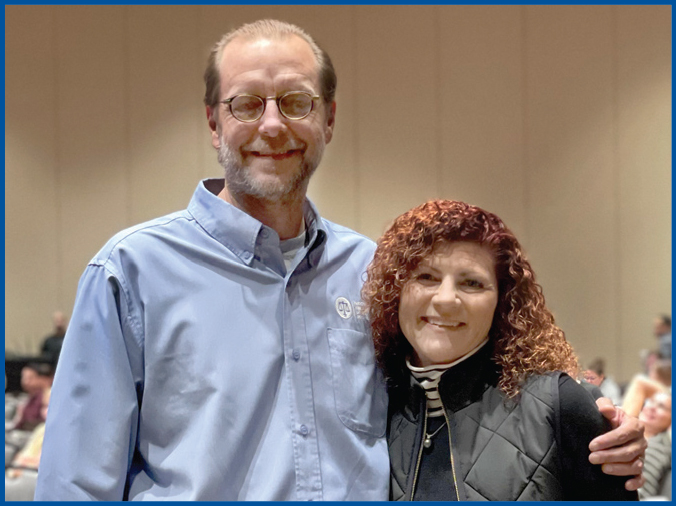
NACDL Staff Member Gerald Lippert and President Nellie King.
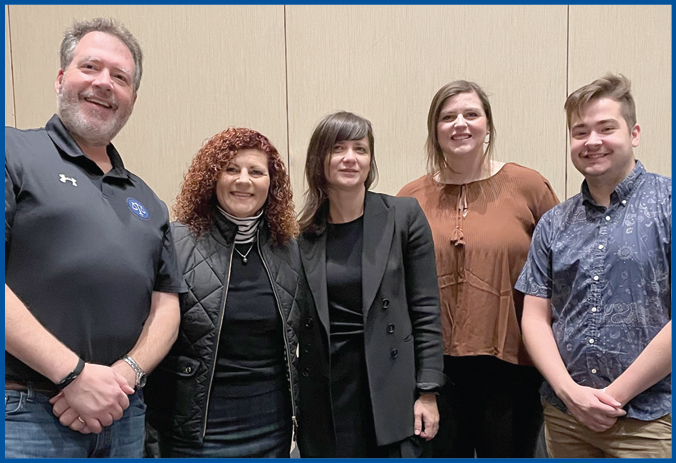
(Left to Right) Jason Hawthorne Petty, President Nellie King, Akvile Athanason, Kaylie Arntson, and Stanton Cole Granger.
I believe in connecting people-to-people for collaborative impact in the name of meaningful change, as well as for the purposes of personal growth, development, and support. Membership and affiliate development was one of my passions while I served on the NACDL Board of Directors and during my time as co-chair of the Membership Committee. I clearly see that the issues important to members start with what is happening in their own jurisdictions, courtrooms, and hometowns. If NACDL understands the challenges of the practitioner from that perspective, it can better assist the needs of its constituents and their clients.
As I leave the helm of NACDL, I am proud to say the organization represents a connected, diverse, and inclusive community of more than 11,000 members, a record high thanks to the hard work and vision of Stephen Ross Johnson (Tennessee) and staff member Jessica Stepan. Private and public defense members, federal and state practitioners, and law students and professors are all in the tent. That number needs to continue to increase, however, in order for NACDL’s influence and contributions to reach true potential.
I last want to thank everyone who serves on NACDL’s Board and its many committees, as well as the organization’s past presidents. I see each of you for what you bring individually to the organization. I celebrate and respect the dedication, talent, diversity, and creativity of all of our Board members. The hard work and time away from your practices and families is appreciated, and I thank you for stepping up when it was needed the most. You are family.
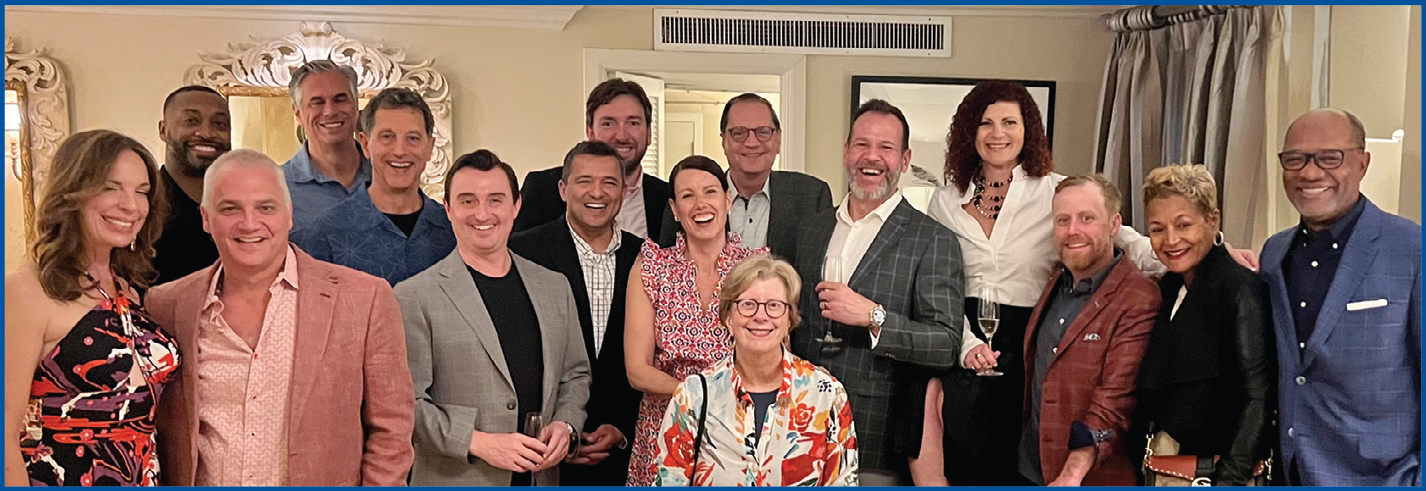
Board Members gather in New Orleans.
Guided by the principles of our mission statement, our bylaws and governance procedures, and our dedication to supporting each other in this work with civility, tolerance, and respect for the autonomy of individual beliefs and approaches, NACDL will thrive for many years to come. It will be my pleasure to continue to walk these miles with each of you in my capacity as a past president of NACDL.
Photos courtesy of NACDL.
About the Author
Nellie L. King is the owner of the Law Offices of Nellie L. King, P.A. She practices criminal defense in state and federal courts throughout the United States and lectures on criminal legal reform and constitutional issues. She is a Past President of the Florida Association of Criminal Defense Lawyers.
Nellie L. King (NACDL Life Member)
Law Offices of Nellie L. King, P.A.
West Palm Beach, Florida
561-833-1084
Nellie@CriminalDefenseFla.com
www.criminaldefensefla.com













